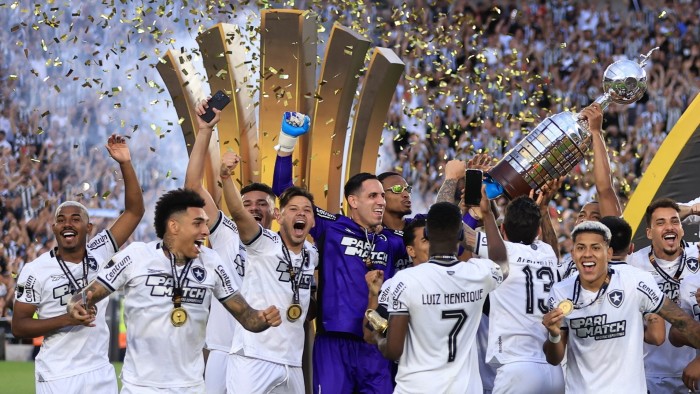There is an old saying in Brazilian football: “Some things only happen to Botafogo.”
Once a nod to the Rio de Janeiro team’s apparent bad luck, it has taken on a different meaning after a remarkable turnaround in the club’s fortunes made it a model for investment in the country’s football industry.
Botafogo last month ended an almost 30-year wait to be crowned national champions, less than three years after being saved from potential bankruptcy by US businessman John Textor.
Days earlier, the side clinched its first Copa Libertadores, the South American equivalent of the Champions League, with a 3-1 victory despite having a player sent off in the first minute.
“Just winning in normal fashion wouldn’t have been anywhere near as fun,” said Textor, whose acquisition was among the first in a wave of Brazilian football takeovers. “People are going to look at Botafogo as an example,” he told the Financial Times.
The team’s newfound glory comes amid a push in Brazil to modernise the business side of its football industry, which has in recent years attracted hundreds of millions of dollars of funding pledges and worldwide attention.
Domestic football in Brazil has long suffered from off-field mismanagement, despite the country’s renowned passion for the sport and reputation as a talent factory.
The result was financial problems at many clubs, traditionally run as non-profit associations controlled by fans, as well as commercial underdevelopment and the premature exodus of young players overseas.
After legislation in 2021 encouraged teams to become limited companies that can sell shares, six of 20 in the top Série A division last season were backed by investors.
Ricardo Fort, a sports business consultant, said it was “too early to tell whether it will be a widespread success beyond Botafogo. But a lot of these clubs are doing better than before, or are on a path of improvement.”
Reformers say the old model often led to poor stewardship by directors with an eye on re-election by fans, preventing long-term planning. The rationale behind the new corporate template, known by its Portuguese acronym SAF, is that an owner brings more responsibility and professional administration.
While the financial stakes are low compared with the game in Europe, Brazilian football has drawn some big names. Manchester City proprietor City Football Group, controlled by a member of Abu Dhabi’s ruling family, purchased Esporte Clube Bahia in 2023 and agreed to invest a minimum of R$1bn ($160mn) over 15 years. This helped the team qualify for the Libertadores after a 35-year absence.
Overall revenues at Série A clubs rose more than a fifth to R$8.8bn in 2023, according to consultancy Convocados. Cesar Grafietti, a partner at the firm, said turnover had risen again last year thanks to sponsorship from sports betting companies, higher ticket sales and the Libertadores prize money, paid in dollars like Botafogo’s $23mn winner’s cheque.
“The SAFs have introduced greater controls, a more corporate vision, with investment in the right places — technology, scouting, marketing and staff training,” he said.
Yet old habits die hard. Grafietti noted how debts among top clubs remained high, totalling R$11.7bn in 2023, with some spending beyond their means.
Textor’s investment in Botafogo was not his first foray into football. With a background in virtual reality and visual effects, he also owns a minority stake in London team Crystal Palace and leads the multiclub group Eagle Football Holdings.
The entrepreneur did not pay for his 90 per cent shareholding in Botafogo, but instead committed to invest R$400mn and help pay down borrowings. Revenues were projected to be higher than $100mn for 2024, according to Textor, representing a fivefold jump since the takeover.
“We did that with free and low-price ticketing to bring more people into the stands,” he said. “Wednesday night at 9.30 and you’ve got a full house. People see these numbers and they know business is good.”
Yet the American has at times courted controversy. He has previously clashed with Brazil’s football authorities after levelling allegations of corruption. Financial concerns have hung over another of his outfits, Olympique Lyonnais, which has lately been pushing to sell players, including to Botafogo, to raise funds.
Not all the recent Brazilian deals have played out well. Miami-based private equity firm 777 Partners purchased Botafogo’s rival Vasco da Gama in 2022, with pledges to pay off R$700mn in debts and invest an equal amount, according to reports. But a court this year seized control from the investment firm, whose sports business empire has unravelled.
Nor does SAF answer all issues around governance and management, say experts, with some top clubs unlikely to embrace it. Palmeiras and Flamengo, Brazil’s two most decorated sides, are both credited as well-run associations, while Corinthians has ruled out becoming a company.
Looking ahead, industry figures say the best way to take Brazilian football forward is though a new domestic competition controlled directly by clubs, along the lines of the English Premier League, and sold as a single product to broadcasters.
As almost all income in Brazilian football is generated domestically, teams need to explore foreign audiences if they want to expand. “At some point they’ll need international revenues to grow,” said the consultant Fort.
But efforts have foundered. Disagreements over how to distribute money between clubs led to two rival groupings, which have pooled transmission rights separately to market packages of matches.
Fans at other Brazilian teams seeking big money backing will be dreaming of the kind of transformation enjoyed by Botafogo.
“Textor has taken the club to the next level,” said Francisco Lima, 21, a supporter still savouring the unexpected league and cup double. “We’re all still ecstatic, not really believing this has happened.”
Additional reporting by Beatriz Langella in São Paulo
Read the full article here

